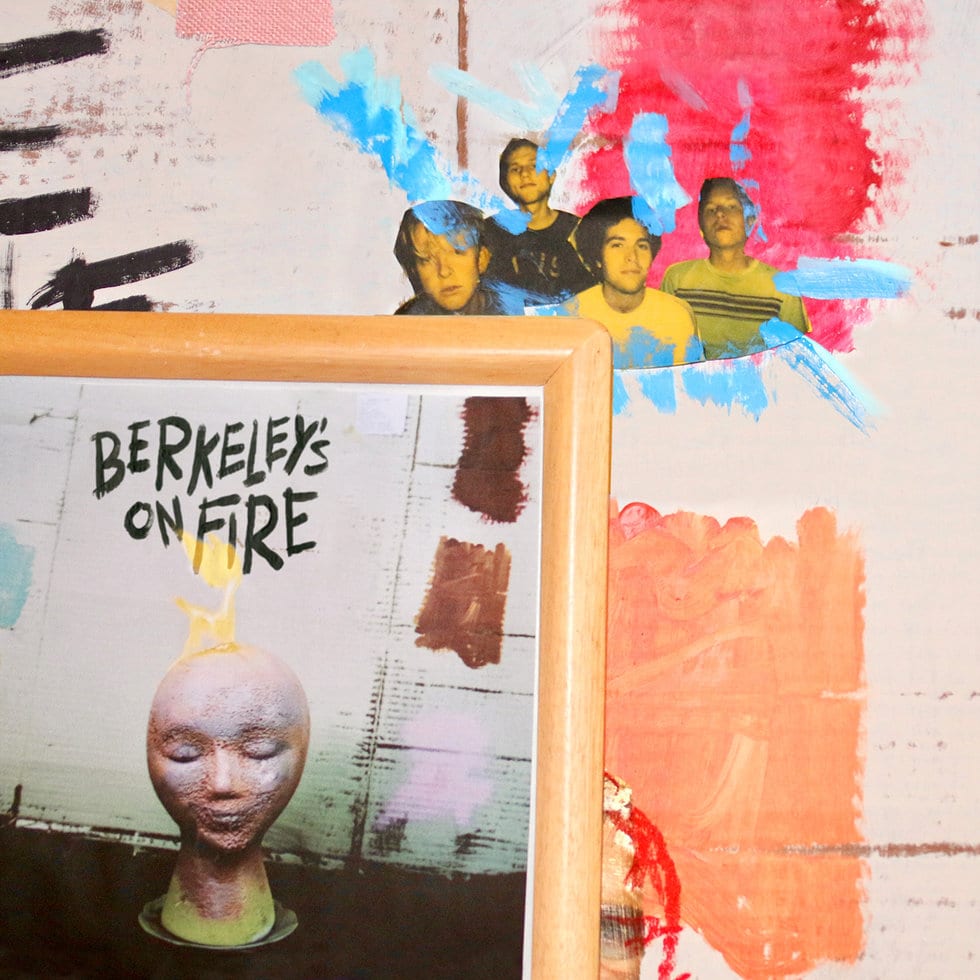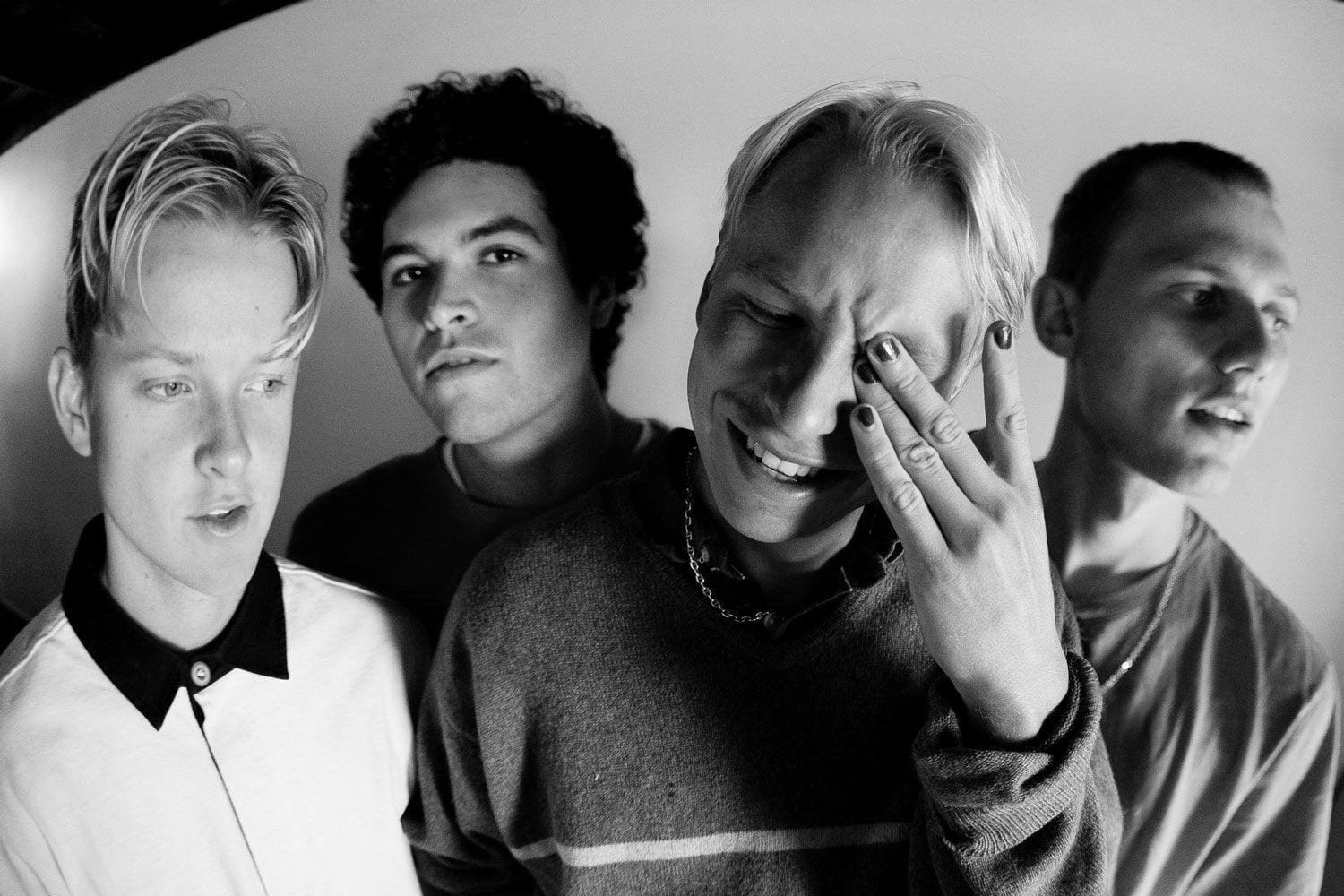
SWMRS‘ new record on Fueled by Ramen comes two years and two weeks after white-nationalist creep Milo Yiannopoulos was set to speak at UC Berkeley and protesters just about burned the place down. The band makes it pretty clear where they stand within the opening minutes of the album, whose first song and title track is called “Berkeley’s on Fire”. The implied next sentence: “let it burn”.
It’s a bold clearing, a warning for centrists to get the fuck out of here. Ever since they were Emily’s Army, the East Bay punk band’s commitment to justice was obvious. The band’s Becker brothers, Cole and Max, named the band for a cousin with cystic fibrosis and used the band to promote a fundraising effort of the same name to raise money for her lung transplant; she now has a fully functioning set of lungs. The band’s SWMRS Fund gives a dollar from each ticket on tour to a different group quarterly: the Girls Rock Camp Alliance, the National Bail Fund Network, the Third Wave fund for women and queer youth of color.
The band will probably always be compared to Green Day. Drummer Joey Armstrong is Billie Joe’s son, and they don’t deny the big man gave them a lift up early on. But while Green Day’s political songs preach broad messianism, SWMRS have razor-sharp focus: if they can’t change the world, they at least can change some people’s minds, and they can certainly do more than if they were playing garages for cans of Coors.
Not to necessarily say their music wouldn’t have caught anyone’s notice: though they started in the mold of the bands that sprung from 924 Gilman in the late 1980s, they’re dabbling in dub and hip-hop and broadening their palate while tightening their sound (the new record is 13 minutes shorter than their last one, 2016’s Drive North). In their omnivorousness—and in Cole Becker’s bark—they’re more properly in the lineage of the Clash, and they might just make their Berkeley Calling in time.
Lead singer and guitarist Cole Becker speaks by phone as he’s walking around Brooklyn:

There’s more of a hip-hop influence on the new album; some of the verses are very rap-like, and there’s even a beat on “Steve Got Robbed.” How’d this come about?
We were hanging out with a lot of rappers and watching them create music, and it was eye-opening. They treat their computers as their terminals and their studios, so you end up getting a piece of music that’s so much more personal.
That’s interesting, given that a lot of people in the punk scene might say computers are phony.
That’s the funny thing: we have people saying they’re phony, but we as a band have spent enough time in studios trying to rush out the product, and when we were able to use a computer as a mobile studio and record music anywhere in any setting we could make ourselves as comfortable and free as possible to make music. I’m not super into electronic music, but I do appreciate having [a computer] as a tool because sometimes it makes you a better writer. If you’re using it and not it using you, that’s how you can get the most out of it. I did some guitar on my computer in a conference room in a hotel in Utah. I heard something, and I really wanted to get it down, so I went to the conference room and recorded it, and we kept the sample and put it in a song. I think it’s “April in Houston”.

You and your brother Max trade verses a lot on this album. Does each of you have a role that you play?
It’s not for any reason but that that my voice bends, it’s more aggressive-sounding, and my brother sings in a much sweeter, more breathy tone, and we write songs for our voices. My songs sound a bit heavy, my brother’s are more soft, but the only thing that makes the music feel really human anymore is the voice. Everything else can be a simulation, but we can’t fake a voice, so we started doing call-and-response so you can trigger people’s brain and they realize it’s a real moment that happened and that could happen between two people.
“Lonely Ghosts” is about being awkward at parties and not wanting or knowing how to talk to people. What could change in society to help everyone get a little more comfortable with each other?
I think ultimately those kinds of rules are dictated by a capitalist, social-climbing mentality: “this person will be useful to me; I should socialize with this person.” That’s ultimately kind of bad because people have so much to offer and are just inherently interesting. Everyone has a funny thing they could tell you if you ask them the right question. We need to encourage people to be more curious about each other. It’s weird enough without having to go into weird parties with people treating you weird. Why not embrace people and just be fucking curious for once?
How can a rock band be socially responsible?
It seems a lot harder than it is. A lot of rock bands don’t care for politics, so they don’t want to speak up, but they don’t realize so many people are listening to what they are saying they can help open people’s minds at least a bit. Everyone’s disarmed when they hear you play music and you can give them useful info, but it has to be beyond that, it can’t be all talk. What we try to do is focus on things that are in our community in Oakland, things in the music industry, trying to get more diversity represented in the touring rock world. I did Boy Scouts and most of the shit they taught us was kind of wack, but they did teach me “do a good thing daily”, so no matter what you do every day, decide to do one thing for other people.


